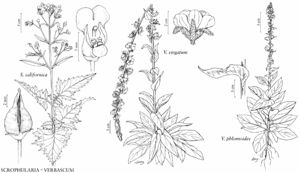Verbascum phlomoides
Sp. Pl. 2: 1194. 1753.
Biennials. Stems (30–)50–200 cm, densely and persistently tomentose, eglandular. Leaves: surfaces densely and persistently tomentose, eglandular; basal and proximal cauline with petiole 40–80 mm; blade ovate-lanceolate to ovate-elliptic or oblong, (10–)15–25(–35) × 4–10(–15) cm, base attenuate; cauline subauriculate-clasping, gradually smaller distally, base not decurrent, rarely slightly so, margins entire or shallowly crenate, apex of distal cauline and floral bracts caudate-acuminate to short-acuminate. Inflorescences unbranched, narrowly cylindric, flowers densely overlapping or remote proximally, in clusters of 2–9; rachis densely and persistently tomentose, eglandular; bracts ovate-lanceolate, 9–15 mm, base short-decurrent or not at all, apex acute to short-acuminate, densely and persistently tomentose, eglandular. Pedicels adnate to rachis at base, 2–8(–15) mm; bracteoles 2. Flowers: calyx 5–12 mm, densely and persistently tomentose, eglandular, lobes lanceolate to triangular; corolla yellow, 30–55 mm diam., pellucid glands absent or relatively few; proximal filaments glabrous at least distally, distal pair villous, hairs white or yellow; stigma spatulate, base decurrent. Capsules elliptic-ovoid, 5–8 mm, tomentose. 2n = 32.
Phenology: Flowering Jun–Aug.
Habitat: Fields, roadsides, disturbed sites.
Elevation: 0–600 m.
Distribution
Introduced; Alta., B.C., Man., Ont., P.E.I., Que., Sask., Ark., Colo., Conn., Del., D.C., Ga., Ill., Ind., Iowa, Ky., Maine, Md., Mass., Mich., Minn., Mo., N.J., N.Y., N.C., Ohio, Oreg., Pa., R.I., S.C., Tenn., Vt., Va., Wash., W.Va., Wis., Europe, Asia, introduced also in South America (Ecuador), Pacific Islands (New Zealand).
Discussion
In the flora area, Verbascum phlomoides is known from a single location each in Manitoba (near Roseisle) and Saskatchewan (near Moose Jaw). The record for Washington possibly is only a waif (King County, Seattle, in waste ground, introduced from Europe, 12 September 1936, W. J. Eyerdam s.n., SMU), because it apparently has not been recorded there since.
Verbascum ×kerneri Fritsch is a hybrid between V. phlomoides and V. thapsus.
Selected References
None.
